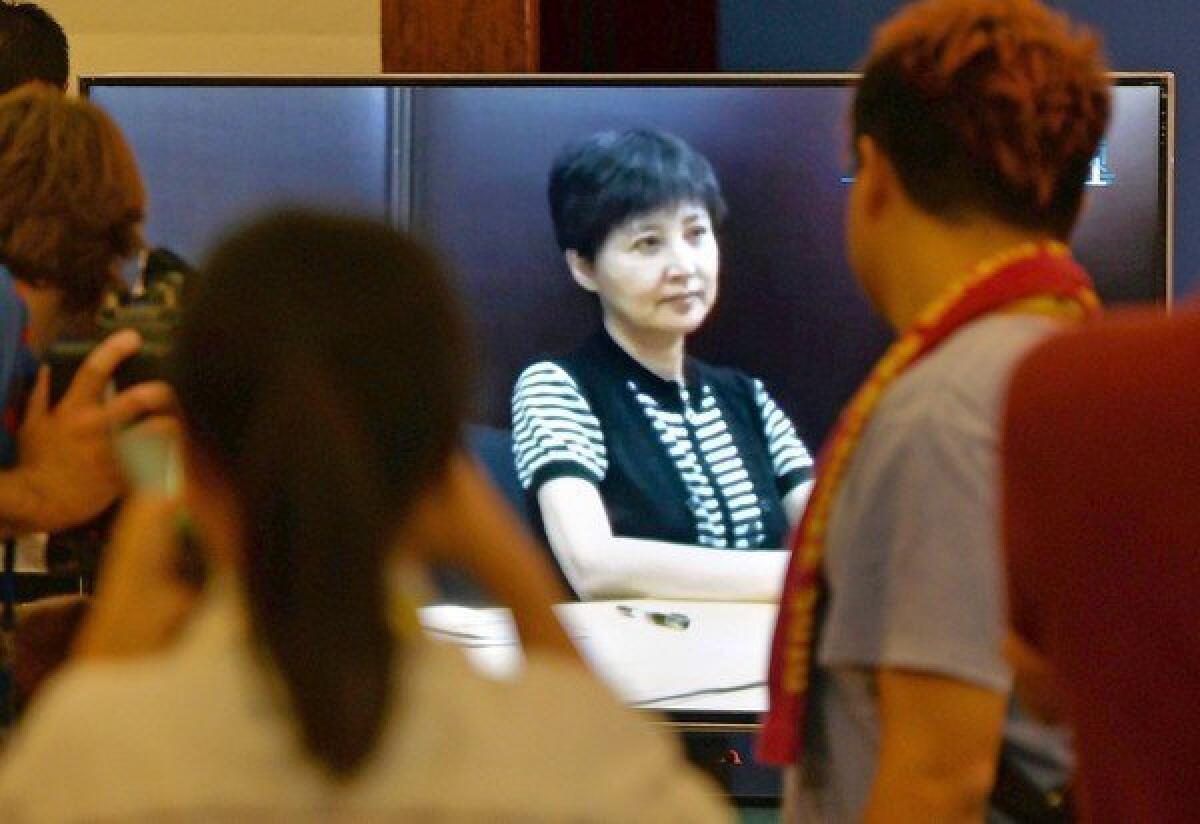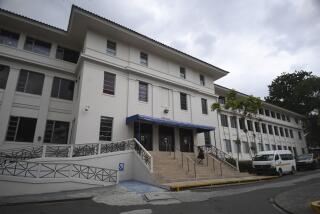Bo Xilai trial transcripts expose a privileged world of wealth

JINAN, China — Meet the Bo family.
Starring in this dysfunctional drama is Bo Xilai, the charismatic Communist Party heavyweight angling to head China. His ice-queen lawyer wife, Gu Kailai, slowly descending into violence. The couple’s spoiled son, Guagua — the name means “melon” in Chinese — who receives gifts including a $130,000 trip to Africa and a $12,000 Segway from a businessman currying favor with his father.
Then there’s the supporting cast of characters, such as the Englishman killed by the wife in a business spat and a conniving police chief who blows the whistle on the whole bunch of them.
The corruption trial of Bo Xilai is offering the world a peek past the vermilion walls of the Chinese leadership compounds and through the tinted glass of their motorcades into a private sphere of immense entitlement. It is a cross between reality television and a soap opera, though adapted for the 21st century with the transcripts being microblogged by the court and closely followed by hundreds of thousands of Chinese.
This drama is not so much about sex (although there is some) as it is about money. Lots of it, stuffed into safe deposit boxes and used to buy real estate, plane tickets, hotel rooms and to charter private jets.
In video and written testimony presented to the Jinan Intermediate Court on Friday, the second day of the trial, Gu Kailai described how she would telephone Xu Ming, a multimillionaire businessman, whenever she needed money.
Xu, a petrochemical tycoon, was used as a bank and travel agent. The family called him when Guagua ran up a credit card bill he couldn’t afford. Xu booked and paid for frequent trips between China and Britain — where Guagua attended the prestigious Harrow prep school and later Oxford — and for trips to Cuba and Argentina, Venice and Paris. Guagua flew to Germany to see the 2006 World Cup.
When Guagua mentioned he wanted to visit Africa with some friends, his mother rang Xu and presto — the businessman chartered a plane for six people from Dubai to Mt. Kilimanjaro. When Guagua had friends coming to Beijing, he would ask Xu to reserve (and pay for) their rooms, in five-star hotels of course. (According to the testimony, this included a delegation of 40 people from Harvard University’s Kennedy School of Government, where Guagua received his graduate degree.)
“It was convenient to call Xu Ming,” Gu, 54, testified on video, appearing calm and well-coiffed despite serving a prison term for murder. “We were in the habit of calling him. He used to pay for things. We didn’t consider him an outsider.”
Gu naturally turned to Xu when she decided to invest in a villa with a swimming pool on the French Riviera. She and a French architect friend, Patrick Devillers, set up a holding company into which Xu deposited more than $3 million. Devillers and later the Englishman, Neil Heywood, were appointed to register the property in their names and manage it.
Like so many vacation homes, the villa in Cannes proved to be a money pit and, worse, Gu’s undoing. Despite a renovation, it was never rented out for enough money to cover taxes and expenses. Angry about the failed investment and convinced her foreign friends were cheating her, Gu removed Heywood from the deed in 2011.
Heywood was furious and insisted that Gu owed him $2.3 million for his share of the property and his work.
Heywood “threatened if his demand wasn’t met, he would completely expose” her overseas wealth, Devillers testified in a written statement to the court released Friday.
Gu in turn became increasingly paranoid, convinced that Heywood would kidnap and kill her son, who was at Harvard then. She asked Wang Lijun, the police chief in Chongqing, where Bo was Communist Party secretary, to provide protection for her son.
Heywood, 41, was found dead in a Chongqing hotel in November 2011. Gu pleaded guilty last year to poisoning him.
In court Friday, Bo said he thought his wife was mentally ill and that her testimony wasn’t reliable. “She became crazy. She started telling lies,” he said. He recalled that after Heywood’s death, Gu told him she imagined herself as a legendary Chinese assassin who murdered an emperor.
Bo, handling much of his own defense, depicted himself as an estranged husband and father uninvolved with the family finances because he was so busy with the weighty affairs of state. And affairs of heart. He said his wife had been virtually living in England with their son for some years as result of his infidelity.
“I had an affair and she was furious about that. She took Guagua away, to a large extent to get back at me,’’ Bo said Saturday.
On the occasions that the estranged couple saw one another, he testified earlier, his well-educated wife wouldn’t have been so “low class” as to talk about small financial details like plane tickets.
Or even big ones like, for example, a six-bedroom 40,000-square-foot villa in France?
The only time he ever heard about the $3.3-million property, he said, was once when Gu played for Xu a slide show set to music that she had prepared for potential renters showing off her renovations. Bo said he wasn’t interested and didn’t pay attention.
“This villa was of no use to me. Being who I was back then, holding my position, if I were to go to a house in France, I would face a lot of risks,” Bo told the court.
Bo held a series of ever-higher government posts — mayor of the port city of Dalian, Communist Party head for Dalian, Liaoning provincial governor, China’s commerce minister and, finally, Chongqing party head and Politburo member — during the period Xu was lavishing the family with gifts.
The Dalian-based Xu, just 22 when Bo became mayor, somehow transformed a small seafood refrigeration business into a conglomerate with interests in chemicals, real estate and banking.
Prosecutors have been unable so far to show that Xu received any favors from Bo. Bo did help him buy Dalian’s soccer team and advertise it with a large hot-air balloon, but all parties testified that those were money-losing ventures that Bo had supported to help the city.
Gu’s testimony about her husband was lawyerly and cautious. In written statements over the last year, she claimed to have told Bo about Xu’s largess. But in her video testimony, recorded Aug. 10, she retreated from that assertion and said only that “he should have known.”
Most striking, all members of the family sounded cavalier about the large amounts of money they handled. Although Bo’s official salary was only $19,000 a year, he scoffed at the lowly amount when evidence was presented about $130,000 in hundred dollar bills placed in the couple’s safe, allegedly a bribe.
“Oh, she [Gu] had much more money than that,” Bo said.
So far, many Chinese appeared to agree with him that the amounts of money discussed were relatively small, especially compared with other government corruption cases. In a recent trial, former Railways Minister Liu Zhijun was found to have more than $130 million worth of real estate and $10 million in cash, most of it ill-gotten gains.
The amounts being discussed in the current case, said one microblog commentator who heads an education company, “barely match Bo’s high position.”
The trial had been scheduled to last two days but was extended to Saturday. A verdict is expected in early September.
Tommy Yang in The Times’ Beijing bureau contributed to this report.
More to Read
Start your day right
Sign up for Essential California for news, features and recommendations from the L.A. Times and beyond in your inbox six days a week.
You may occasionally receive promotional content from the Los Angeles Times.






